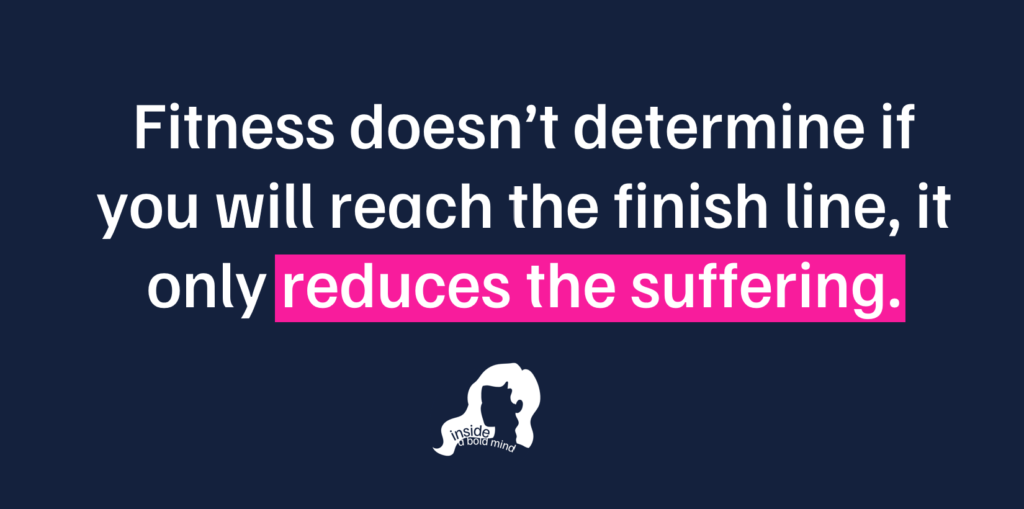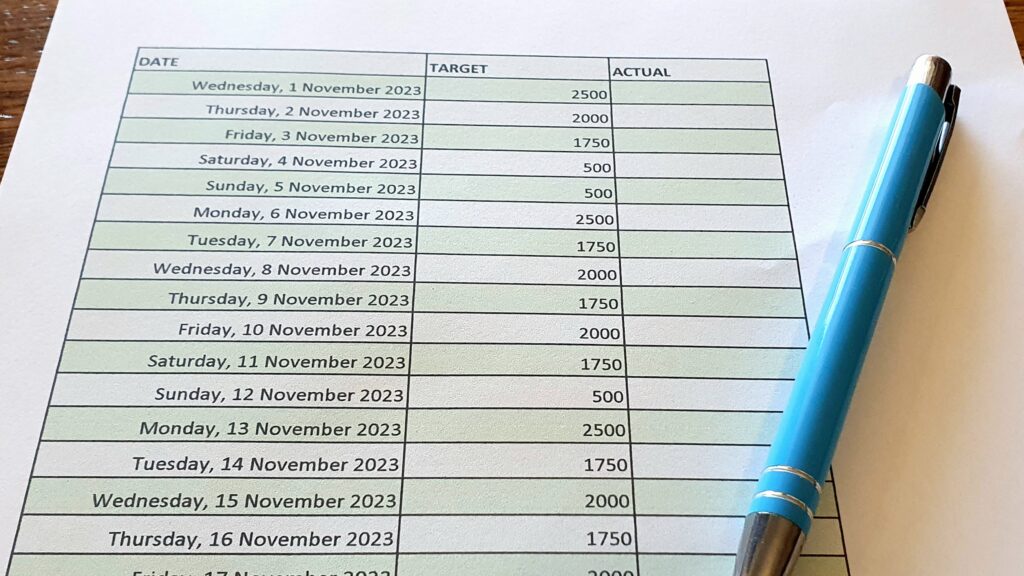My Game Plan
[NaNoWriMo #2/6] Today, I share my five-point game plan for succeeding during NaNoWriMo, a 30-day writing challenge in November 2023.
Tactic 1: Mindset
From ultra-runner to ultra-writer: Will the stamina I developed as an ultrarunner rise again? I will need it because my mind is already trying to turn the NaNoWriMo molehill into a mountain.
During my time as an ultra-runner, I had a few favourite mantras that I used to remind me that it was my willpower, not my skill as a runner, that would get me across the finish line.
Top of the pops is “Where the mind goes, the body follows.”
Those sweet seven words reminded me to continually check in on my thoughts, especially those brewing below the surface. Twenty-four hours into an ultramarathon, mind control is no simple task as the sun rises for the second time without sleep. I can barely pronounce those seven words, let alone execute their intention, but still, they served me well.
Next on my list of favourites is “Stay away from the adrenaline.”
Fatigue and searing pain do strange things to the human mind. I’m usually the type of person who holds themselves to account for their decisions and actions. But deep inside ultra-suffering, my mind can start spewing mental vomit of anger, blame and frustration. Science tells me that my mind goes through that thought pattern because it interprets the suffering as a threat and then adrenalises my body to activate my fight-flight response.
Adrenaline can be beneficial when running short distances as it helps release power in your muscles. However, your adrenaline supply is finite, and you’ll drop off an energy cliff when it runs out, which increases the likelihood of failure during endurance challenges.
The zone of failure is nestled between two bookends of enthusiasm. At the beginning of endurance challenges, it is easy to feel hyped because I’m off on a new adventure. Toward the end, the prospect of reaching the finish line keeps me going. But the section in the middle, well, I’ll call that the “feral third” for good reason.

Of course, my other immediate mental issue for NaNoWriMo is to conquer the Mountain of Extra Work (Shall we call it the MEW? Pronounced meeuuwww, like you’ve just sniffed out-of-date milk).
As I mentioned in #1 Opening The Void, when I think of NaNoWriMo and writing 1500 words for 30 consecutive days, the first thought that pops into my mind is, “Gosh! That’s a lot of extra work!”.
Can you see how I’m already setting myself up to fail with that thought? If I place the task outside my comfort zone, I substantially increase the likelihood of not achieving my goal.
You might think a bold human like me shouldn’t have negative thoughts, but that’s hogwash.
I have them, but the difference is that I recognise them early and respond constructively. Others tend to turn negative thoughts into inhibiting self-doubt.
When I pick up on negative thinking, I’ll acknowledge it immediately rather than let it brew. I’ll then reshape the thought like it’s potter’s clay and make it into something useful.
A couple of years ago, I developed a process for mapping my intrinsic motivation (I teach it in Answer Your Calling). I identified six elements that genuinely light my fire; creativity and problem-solving are among them. I can use those to morph my MEW into a motivational trigger.
Here’s the before and after to show you what I mean.
BEFORE
“Gosh! That’s a Mountain of Extra Work!”
AFTER
“How wonderfully indulgent! During the next 30 days I’m dedicating 1-2 uninterrupted hours a day to being in pure creative mode. I wonder what insight gems I’ll find?”
Tactic 2: Forward Only
As mentioned in #1 Opening The Void, I will write the first, whole, rough draft of “Dare To Be Your Boldest.”
Rough drafting means I’ll write in a stream-of-consciousness style and only move forward. There will be no going back to re-write, edit, or rethink. I’ll add a footnote to the page for later reference if a new idea emerges and I want to revisit earlier writing.
Going backward burns time, energy and enthusiasm, and I want to see the ideas that emerge when I open the void.
Tactic 3: Word Countdown
To reach the 50,000-word target, I must average 1,500 words a day, and there are two ways I could approach that:
- Use the “sacrifice” method, which is writing 1,500 words a day regardless of what else is going on or
- I can adjust the daily word count to accommodate significant events throughout the month.
I’m too old to be bothered doing the sacrifice method. People and life events are far too precious to me these days to have them play second fiddle to a word count. My dad’s 80th birthday is this month, and our family is gathering. I’m travelling during the 16 Days of Activism that start on 25 November, and I’m delivering Dare To Be Your Boldest to a group at Sydney University. I want to be fully present in all these moments, so I’ll shuffle the word count onto other days.
I’ve created a spreadsheet with dates and word-count targets varying from 500 to 2,500 depending on what’s already booked for that day.

Tactic 4: Daily Writing Prompts
I’ll use the slides from my keynote version of Dare To Be Your Boldest as the map for my writing.
The keynote version of Dare To Be Your Boldest emerged from my failed “first-first” book draft (See #1 Opening The Void). All the meandering writing helped me realise that I wasn’t sure of the story I wanted to tell. It’s taken hundreds of hours of work and presentation to refine Dare To Be Your Boldest into a story with integrity, strength, focus and usefulness to the audience.
Conveniently, the 25 slides in the presentation will build out to 30 days of writing. Using it as the backbone of the book draft will take that content to the next level as I uncover forgotten memories and insights into what makes a bold mind tick.
Tactic 5: Slot Into My Existing Routine
People have often commented that I must have extraordinary discipline to keep all my various projects afloat. That’s not the case. What looks like discipline is actually an embedded daily routine.
Currently, most of my days tend to flow like this:
- 06:30-Try to open my eyes and get out of bed
- 07:30- Family leaves for work/school
- 07: 30-08:30 – Feed animals (cattle, horses, bison – dry conditions)
- 08:30-10:30 – Computer time (charity work, writing, client work)
- 10:30-12:30 – Farmwork
- 12:30-13:30 – Lunch, housework
- 13:30-15:30 – Computer time and/or meetings
- 15:30-18:30 – School bus run, farmwork, miscellaneous
- 18:30-20:30 – Dinner, family time, fall asleep on the lounge.
I’ll slot NaNoWriMo into the morning “computer time” and adjust what I would typically do during that slot to fit in later in the day.
So, there you have it, my game plan for NaNoWriMo2023. We will have fun together discovering which parts of that plan prove useful and which end up dumped before I start.



